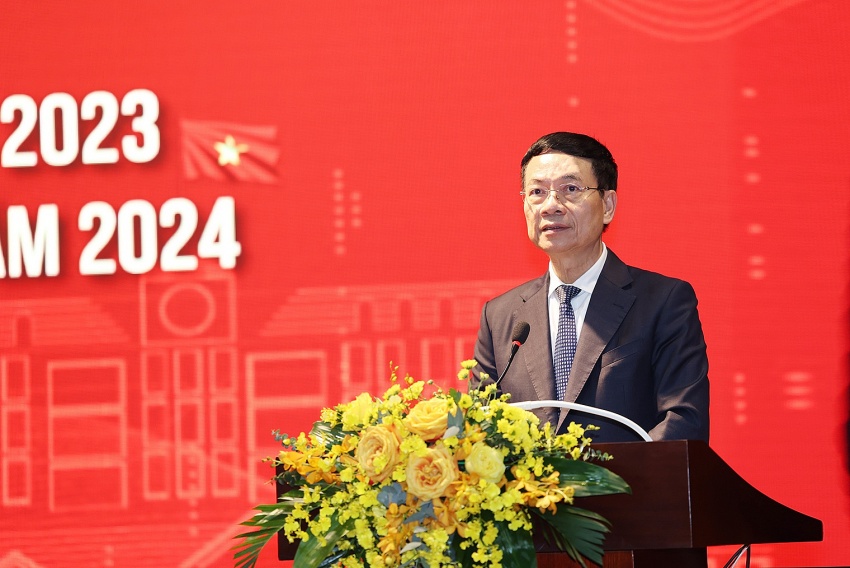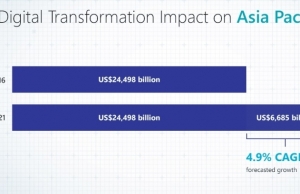Vietnam’s ICT industry: Outstanding results in 2023 and new plans for 2024
The Ministry of Information and Communications (MIC) held a meeting on December 29 to review the sector's 2023 performance and identify the key tasks for 2024.
 |
Improvements in 2023
In 2023, the total revenue from the information and communication industry is estimated at $158 billion, an increase of 1.49 per cent compared to 2022. Its state budget contribution is estimated at $4.19 billion, up 1.31 per cent on-year. 2023 also saw the total number of employees in the Industry increase by 2.72 per cent.
The building and completion of institutions and legal documents continued to be prioritised last year, especially the Law on E-Transactions and the amended Law on Telecommunications, which were passed by the National Assembly to create a favourable legal framework and a driving force for the industry's development.
 |
| Minister of Information and Communications Nguyen Manh Hung |
In 2023, postal service revenue reached $2.48 billion, an increase of 9.3 per cent on-year. Vietnam moved up one notch in its ranking in the 2023 postal development index (from group 5 to 6, with group 10 being the best).
The industry has seen telecommunications and digital infrastructure make strong improvements, facilitating the goals of Digital Government, Digital Economy, and Digital Society.
Although it is a lower-middle-income country, Vietnam has higher 4G coverage than high-income, developed nations. It currently reaches 99.8 per cent, while the threshold of high-income countries is 99.4 per cent.
5G testing has been deployed in 59 provinces and cities. The number of smartphone users has continued to increase to 84.4 per cent, higher than the global average of 63 per cent. The aim is to grow this to 100 per cent by the end of 2024.
In addition, household fibre optic cable coverage hits nearly 80 per cent, compared to the world average of about 60 per cent. This is part of the goal of promoting comprehensive digital transformation for all and leaving no one behind in the digital transformation process.
The country's use of new-generation IPv6 internet addresses ranks second in ASEAN and ninth globally, placing it above major power nations such as China, the US, and Canada.
2023 also witnessed strong development in the digital technology industry. Its revenue reached $142 billion, with a value proportion of 28.7 per cent. About 1,500 digital technology businesses make revenue from foreign markets, an increase of nearly 4 per cent compared to 2022.
Amidst the acceleration of digital transformation, cybersecurity is a high priority. During the year, more measures were taken to protect people in cyberspace.
Over the year, Vietnam achieved impressive results in international competitions on information security. The number of IP addresses located on the Botnet network has continued to decrease over the past five years, down nearly 70 per cent since 2018.
2023 was also the year of innovative approaches to protecting users in cyberspace. Nearly 125,000 website sources were established, connected, and integrated with network information security solutions.
The audiobook market revenue reached over $4.3 million, increasing twofold compared to 2022.
The rate of publishers registered to operate electronic publications is estimated at 40.3 per cent, 20 per cent higher than the plan. The number of e-books published over the year is estimated at 4,600, an increase of 31.4 per cent and accounting for 15.3 per cent of the total number of publications – exceeding the annual target of 12 per cent.
New plans and tasks for 2024
In 2024, the country will develop its digital economy with a focus on the four pillars of the ICT industry, digitalisation of industries, digital management, and digital data.
Speaking at the meeting, Minister of Information and Communications Nguyen Manh Hung said that the National Digital Transformation Programme has run for four years with different stages. Now, the conditions are right to accelerate the process to maximise socioeconomic development.
“The digital economy is an important driver of economic growth. Vietnam's digital economy accounts for 16.5 per cent of the national GDP and always has a growth rate about three times higher than GDP growth. It also helps increase productivity, a target that we have not achieved for many years,” the minister noted.
According to the MIC, 2024 will be the year to universalise the digital infrastructure and other foundational elements of the digital transformation.
Online public services must be comprehensive and substantive, allowing procedures to be done remotely from home. The target is to reach an adoption rate of 70 per cent of the population.
The more data AI has, the smarter it becomes. Therefore, authorities at all levels should transfer difficult and time-consuming tasks to AI, allowing them to focus on more creative and interesting tasks.
The MIC is directing the development of four main virtual assistants to support civil servants, detect conflicts in legal documents, provide legal advice, and aid judges. Virtual assistants have been in use to help judges for more than a year already, reducing processing times by up to 30 per cent.
The amended laws on e-transactions, telecommunications, and frequencies have formed the legal basis for developing digital infrastructure and promoting national digital transformation. However, there are still a number of issues that need to be improved, such as financial and bidding regulations, pricing, and measurement unification.
 |
| Deputy Prime Minister Tran Luu Quang |
Addressing the meeting, Deputy Prime Minister Tran Luu Quang said that in today's rapidly developing era, the vital role of the information and communications industry is to promote digital transformation to close the gap between Vietnam and the best in the world.
“There needs to be specific mechanisms for special fields, or problems cannot be solved. The ICT industry has been assigned many noble tasks, which come with great expectations. With so many strong businesses and their great resources, if there are the right policies and mechanisms, it is possible to harmonise the interests of the state with those of businesses and the community,” he noted.
 | Developing a digital economy for the 21st century Green growth and digital development are likely the most anticipated trends in the first half of the 21st century, helping a country develop fast and sustainably. Nguyen Manh Hung, Minister of Information and Communications, writes about these trends and their importance for Vietnam. |
 | Vietnam, UK enhance cooperation in digital economy, digital transformation Vietnamese Minister of Information and Communications Nguyen Manh Hung and the UK’s Parliamentary Under Secretary of State at the Department for Digital, Culture, Media and Sport Chris Philp signed a Letter of Intent on cooperation in digital economy and digital transformation on November 1 (London time). |
 | The key to Vietnam’s digital transformation On Vietnam Digital Technology Business Day on December 12, it was announced that the community of 64,000 Vietnamese digital tech businesses made revenues of over $135 billion this year. |
 | Vietnam to auction 3,700MHz band as part of 5G deployment The Ministry of Information and Communications (MIC) plans to auction the 3,700MHz band as part of its wider 5G deployment in the near future, it said at a press conference on November 6. |
What the stars mean:
★ Poor ★ ★ Promising ★★★ Good ★★★★ Very good ★★★★★ Exceptional
 Tag:
Tag:
Themes: Digital Transformation
- BIM and ISO 19650 seen as key to improving project efficiency
- Viettel starts construction of semiconductor chip production plant
- Vietnam, UN strengthen cooperation in digital technology, AI
- Vietnamese firms win top honours at ASEAN Digital Awards
- ASEAN Digital Ministers' Meeting opens in Hanoi
Related Contents
Latest News
More News
- Financial sector charts next steps as Party Congress convenes (January 21, 2026 | 09:58)
- Three key dynamics supporting Vietnam’s GDP growth in 2026 (January 20, 2026 | 16:34)
- Carlsberg Vietnam and Grab encourage responsible enjoyment and safer mobility (January 16, 2026 | 19:55)
- Redefining Vietnam’s growth model for the era of innovation (January 16, 2026 | 16:40)
- Nghi Son refinery processes first non-Kuwaiti crude cargo (January 16, 2026 | 16:06)
- Siemens and VSIP announce landmark strategic partnership (January 15, 2026 | 14:48)
- VinFast sets record with 175,099 electric vehicles delivered in Vietnam in 2025 (January 15, 2026 | 14:24)
- Year-end shopping season faces rising uncertainty (January 14, 2026 | 18:11)
- State sector sees broad-based profit surge as major groups deliver strong results (January 13, 2026 | 17:34)
- HSBC forecasts Vietnam's GDP growth to hit 6.7 per cent in 2026 (January 13, 2026 | 17:33)



























 Mobile Version
Mobile Version